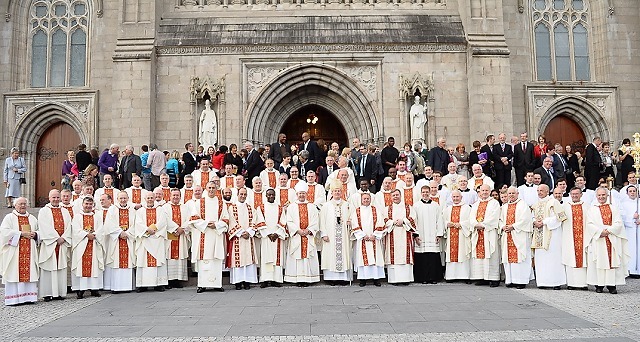Sunday 29th September was a historic day in the Archdiocese where the first Ordination to the permanent Diaconate took place in St Patrick’s Cathedral. Five men, having completed three years formation and theological training, were ordained as deacons for service in five parishes in the Archdiocese of Armagh.
Cardinal Seán Brady, Archbishop of Armagh, was the ordaining prelate for the ordination Mass and Archbishop Eamon Martin, Coadjutor Archbishop of Armagh, preached the homily. Priests of the Armagh diocese were in attendance at the Mass as well as those involved in delivering the theological, spiritual and human formation programme to the permanent deacons.
Click here to view Archbishop Eamon Martin’s homily.
All of these men have undertaken a very intensive formation programme over the past four years and today begin their journey in ordained ministry. These men are:
- Martin Barlow, Parish of Drumcree, Portadown, married to Ursula, two sons, Shea and Oisin. Martin is a graphic designer.
- David Durrigan, Parish of Ardee, married to Ciara, four children, Ella, Dara, Rosa, Treasa. David is an IT consultant.
- Andy Hegarty, Parish of Cookstown, Andy is married to Mary, four children, Paul, Brenda, Niall and Maria. Andy is a prison chaplain.
- Benignus Ndubuisi, Parish of Saint Patrick’s, Dundalk, married to Celestina, four children, Chisom, Chibuikem, Chidinma. Ben is a Health Care Worker.
- John Taaffe, Parish of Drogheda, married to Joan, three children, Amy, Conor and Aaron. John is the National Coordinator of the Irish Bishops’ Drug Initiative.
The first responsibility of the Permanent Deacon is to be an effective visible sign of Christ, who came to serve rather than to be served. Although most of these men will exercise their ministry on a part-time basis, they remain at all times a deacon, and they are called in their lifestyle to reflect this. The ministry of the deacon is an expression of his being, an icon of Christ the servant. The normal areas of ministry which may be entrusted to deacons can be categorised under the general headings: Pastoral, Liturgical and Faith Development:
We ask you to keep these men in your prayers as they begin this important ministry.
FUNCTION OF A DEACON
The first responsibility of the Permanent Deacon is to be an effective visible sign of Christ who came to serve rather than to be served. Although most of these men will exercise their ministry on a part-time basis, they remain at all times a deacon, and they are called in their life-style, to reflect this. The ministry of the deacon is an expression of his being, an icon of Christ the servant. The normal areas of ministry which may be entrusted to deacons could be categorised under the general headings: Liturgical Functions, Pastoral and Faith Development. These include:
Liturgical
- Proclaiming the Gospel at Mass
- Preaching the homily
- Assisting the priest at Mass (Sign of Peace and Dismissal)
- Leading communion services, when need arises
- Bringing the Eucharist to the sick at home and in hospitals (nursing homes)
- Presiding at Exposition and Benediction of the Blessed Sacrament
- The celebration of Baptism
- Celebrating Marriages
- Presiding at Funerals – (also removals, reception of remains, burials)
Faith Development
- Participation in sacramental preparation programmes
- Formation of Ministers of the Eucharist
- Formation of Ministers of the Word
- Formation of Altar Servers
- Facilitating study of, and prayer with, the Scriptures
- Facilitating the development of lay ministry
- Chaplaincy to various parish groups
- School chaplaincy
Pastoral
- Visiting the sick
- Visiting prisoners
- Visiting the bereaved
- Youth Ministry
- Working with the poor and the homeless
- Promoting awareness of the social teaching of the Church
- Promotion of justice and human rights
A Permanent Deacon receives his mission from the Archbishop, and is assigned to work as a member of a team under the leadership of the Parish Priest. He is called to minister in close-collaboration with priests and with laity who are entrusted with various ministries. Deacons play a key role in the development and coordination of lay ministry, they are not intended to replace lay ministries. These men have been reminded that in a parish they find their role by negotiation, supporting what already exists and helping to address needs that aren’t being met.
























You must be logged in to post a comment.